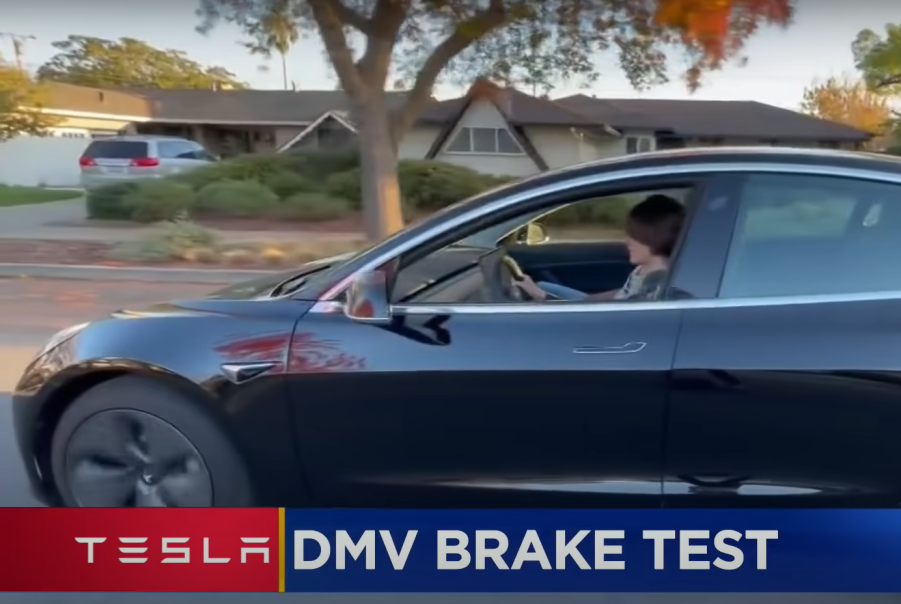
Teen Failed Driving Test Because of Tesla Model 3 Braking System
We covered a couple of unusual stories about the Tesla Model 3 in recent weeks. One article is about a Tesla Model 3 disguised as a coal-rolling diesel truck. Another is about a woman attacking a Model 3 after mistakenly thinking its owner stole electricity. Now, we have a third unusual Model 3 story. A teenager failed a driving test with the DMV due to the Tesla Model 3 regenerative braking system.
Tesla Model 3 regenerative brakes result in failed DMV driving test

Earlier this month, 16-year-old Bryce Rosenblum took his family’s Tesla Model 3 for a driving test in Gilroy, California, as reported by KPIX CBS SF Bay Area. After completing the driving test, Rosenblum felt confident that he drove well enough to pass, for he didn’t make any driving errors. However, the DMV examiner disagreed and gave Rosenblum a failing score.
Why didn’t Rosenblum pass the driving test? Despite his confidence in how he drove, he knew that the DMV examiner would probably give him a failing score. This is because she had an issue with how he applied the brakes with the regenerative braking system — or rather, how he didn’t apply the brakes.
Like other electric vehicles, the Model 3 features a regenerative braking system. The Model 3 regenerative braking system has autonomous capabilities. It can stop the vehicle on its own after the driver lifts their foot off of the accelerator pedal. In emergency driving situations, a driver still needs to physically apply the friction brakes.
DMV examiner wanted the teen driver to physically touch the Model 3’s brake pedal
When slowing down to a stop, the DMV examiner wanted Rosenblum to physically move his foot from the accelerator pedal to the brake pedal. However, since the Model 3 automatically brakes on its own when the driver lifts their foot from the accelerator pedal, the teen driver didn’t have to use the friction brakes. The DMV examiner had a problem with this, so she gave Rosenblum a failing score.
“Right off the bat [the DMV examiner] warns me that the car was slowing down on its own, like at a stop sign, and she told me twice before we even left the parking lot. We continued with the test and did everything that the test was supposed to have in it. She then told me I failed.”
– Bryce Rosenblum
California DMV changes course and gives the teen driver a passing score
The DMV is notorious for its inflexibility and long wait times. With this in mind, the next chapter in this story is all the more surprising. Rosenblum’s father, citing the faulty DMV testing procedures for Teslas and other electric vehicles with regenerative braking, said that it is “a broken process.”
He expressed this concern to the DMV, stating, “That’s how the car works.” After reviewing the results of the driving test, the DMV changed course and gave the teen driver a passing score. KPIX CBS SF Bay Area sent an inquiry about the incident to the main California DMV office in Sacramento. Within hours, the DMV sent them this response:
“DMV’s Field Operations Division reviewed the drive test score sheet and has determined the drive test score will be revised as passing. The customer will be advised that their license should be arriving in the mail soon.”
– California DMV
Understandably, Rosenblum was very excited about the news. He passed the driving test, and will soon get his coveted driver’s license. The teenager said that he was “freaking out just a little bit.” His father had a one-word reaction: “Speechless.”
The California DMV also revised its driving test procedures for electric vehicles, stating, “The regenerative braking system shall not be used as the sole reason to score a driving error or critical driving error.” More people will drive electric vehicles like the Tesla Model 3 in the future, so we’ll have to see if other state DMVs follow suit and revise their driving test procedures for EVs as well.


